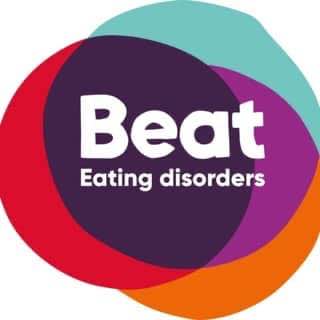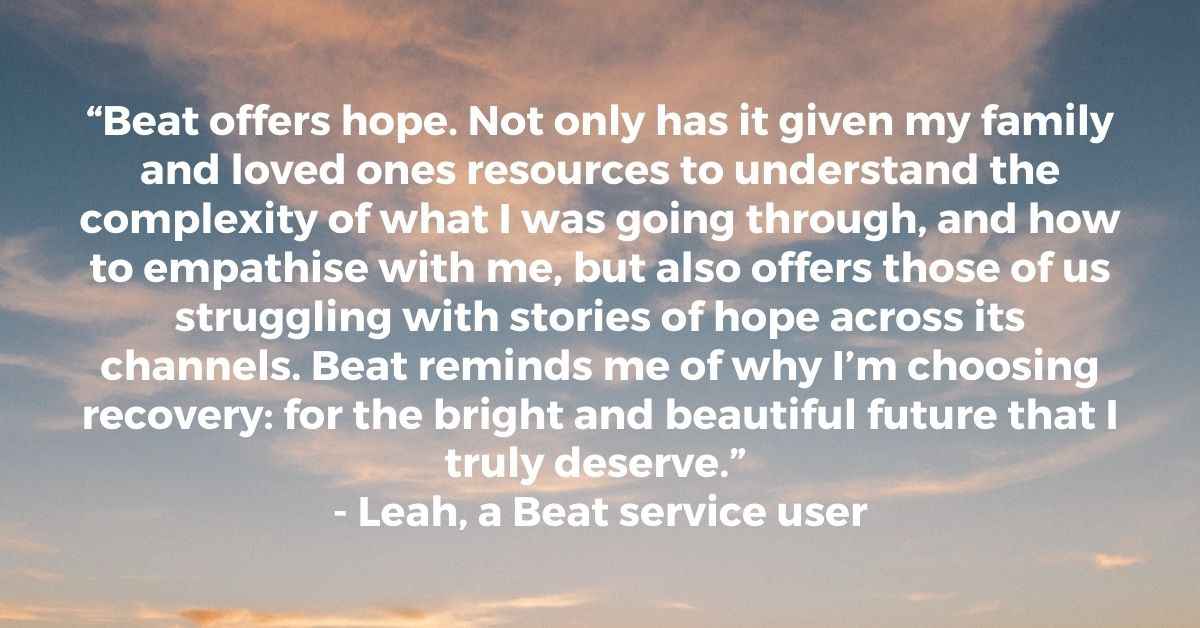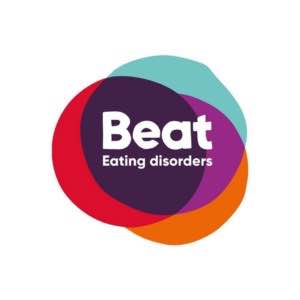Reviewed By Cara Swanston - Registered Member MBACP Adv. Dip.
Eating Disorders - Supporting Yourself
21 September 2021
Beat Eating DisordersEating disorders are serious mental illnesses. There are a lot of misconceptions around them, including what they look like and who can get them, and they can be extremely isolating.

Beat Eating Disorders
Guest Blog
Eating disorders are serious mental illnesses. There are a lot of misconceptions around them, including what they look like and who can get them, and they can be extremely isolating. But if you’re struggling with an eating disorder, or know someone who is, you are not alone. Beat, the UK’s eating disorder charity, supports anyone affected, providing information and running free Helpline services, with the aim of helping those with eating disorders into the early, high-quality treatment they need and deserve.
Getting support for an eating disorder
At Beat, we hear from lots of people who fully recover from their eating disorders, some of whom have been unwell for a long time, but the sooner someone can get the support they need, the best chance they have of making a full recovery. Below are some suggestions for how to get the support you need:
Talk to someone
Telling someone your concerns can be daunting, but is an important first step towards recovery. You could talk to a trusted friend or family member or even a teacher or colleague if you’d prefer to do that before speaking to a healthcare professional. If you’re not sure, Beat runs free, confidential Helplines staffed by trained advisors who will offer you a non-judgmental and supportive space to share what you’re experiencing, and give you guidance on steps you can take towards recovery. Read our information here for more about how to talk to someone if you’re concerned.

Make an appointment with your GP
They should refer you for a specialist assessment – Beat offers a leaflet to take to your GP with sections for you, someone supporting you and the GP themselves to help make sure you get a good outcome from the appointment. You can download this here.
Remember that you’re not alone
Treatment varies from person to person, and there may be waitlists; you may also feel conflicted about recovery because the eating disorder can be a way to cope with difficult thoughts and feelings. Talking to others with similar experiences in a positive and encouraging space may be helpful. Beat run moderated online support groups that people can join anonymously to talk about their situation with others who are going through similar experiences. Three of the groups run for a little over an hour each week and are based on eating disorder experience: Swan (anorexia), Kingfisher (bulimia) and Nightingale (binge eating disorder), though you do not need a formal diagnosis to use the groups. There is also a daily group, the Sanctuary, a general support group for anyone with an eating disorder of any kind. You can visit the online support groups here.
What can Beat offer?

Helplines available via phone, email, and one-to-one webchat. They are open every day from 9am – 8pm on weekdays and 4pm – 8pm on weekends and bank holidays. Call 0808 801 0677 or email HELP@BEATEATINGDISORDERS.ORG.UK
Online peer support groups
Telephone coaching and guided self-help
Workshops for those caring for someone with an eating disorder
Learn more about all of BEATS services HERE.
Featured Organisation
National
Our mission is to end the pain and suffering caused by eating disorders. Our national Helpline exists to encourage and empower people to get help quickly, because we know the sooner someone starts treatment, the greater their chance of recovery. People can contact us online or by phone 365 days a year. We listen to them, help them to understand the illness, and support them to take positive steps towards recovery. We also support family and friends, equipping them with essential skills and advice, so they can help their loved ones recover whilst also looking after their own mental health.
Get Inspired Further
how can beat help me
Beat provide support services for anyone affected by an eating disorder, including those caring for somebody.
eating disorders supporting someone else
Eating disorders affect not only those who are unwell but the people around them too.




